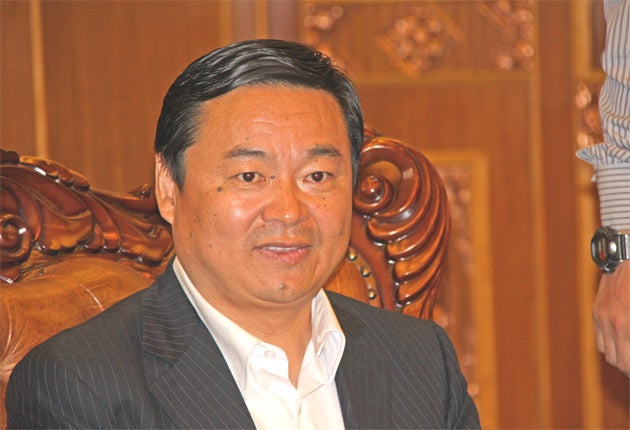China takes softly-softly approach in effort to boost Tibet's economy

Hao Peng cuts an avuncular figure and is unusually frank for a party official in Tibet, where people rioted against Beijing rule two years ago. He is the new, approachable face that China wants to front its multibillion-yuan efforts to boost the isolated mountain enclave's economy and win the hearts and minds of the Tibetan people.
"We are doing our best to improve the quality and calibre of local Tibetans and have also introduced special policies in terms of employment projects, subsidies and grants to help local people," Mr Hao, the deputy secretary of the Communist Party in Tibet and vice-chairman of the regional government, told reporters.
But many Tibetans resent the fact that Han Chinese from other provinces are benefiting the most from the region's development boom.
At the enormous, state-of-the-art railway station near Lhasa yesterday, Han Chinese could be seen alighting from the train, part of the daily influx coming to set up shop. Their businesses are more and more in evidence on the streets of Lhasa, once one of the most remote and mysterious places on earth and still a difficult place to get to.
Mr Hao said the central government was committed to addressing the yawning income gaps and opportunity inequalities between Tibetans and Han Chinese, but added: "It's not unusual that businessmen from other parts of China benefit from Tibet's development, as they help the local economy."
One of the ways he wants to improve the Tibetans' lot is by raising education levels. "When you come back in 10 years you will remark how the farmers' income level here approaches the national average," he said.
However, winning hearts and minds is about more than just building factories and model villages. China faces an uphill struggle to win the affections of residents who support the Dalai Lama.
Mr Hao put the blame for any unrest in the region firmly at the feet of the "Dalai Clique", devotees of the spiritual leader of Tibetan Buddhism who fled Lhasa in 1959, eight years after it was formally annexed by the People's Republic of China.
China says Tibet is, was and always will be Tibetan, but the Tibetan government-in-exile in the north Indian town of Dharamsala says it represents the Tibetan people and wants more autonomy. The Dalai Lama, Mr Hao said, needed to accept that Tibet was an "inalienable" part of China.
In March 2008, monks marched from the Jokang Temple, Tibetan Buddhism's most holy site at the heart of Lhasa, and called for greater freedom. Tensions flared into widespread violence in the Tibetan Autonomous Region and other Tibetan areas in China and 19 people were killed. Tibetan independence groups say scores died in a subsequent crackdown, a claim denied by the Chinese.
Today, soldiers armed with machine guns stand guard on Lhasa's ancient streets. "After 14 March we have taken many efforts to maintain stability. Unity is a blessing while instability is a curse. The People's Armed Police on the street are necessary to enforce stability," Mr Hao said. "We have the ability and confidence to... ultimately achieve long-term order and stability."
The reason ordinary Tibetans were not allowed to display pictures of the Dalai Lama, whom they worship as a god-king, is that he is "not just a religious figure, he is also a mastermind of separatist activities".
"No sovereign country in the world would allow the hanging of a portrait of a person like that... the Dalai Lama colluded with anti-China forces abroad to make trouble in Tibet," Mr Hao said. "What you see in the streets, including the police and other legal forces, are necessary measures to maintain stability... the local, ordinary people love the country, they love the Communist Party of China."
Join our commenting forum
Join thought-provoking conversations, follow other Independent readers and see their replies
Comments
Bookmark popover
Removed from bookmarks